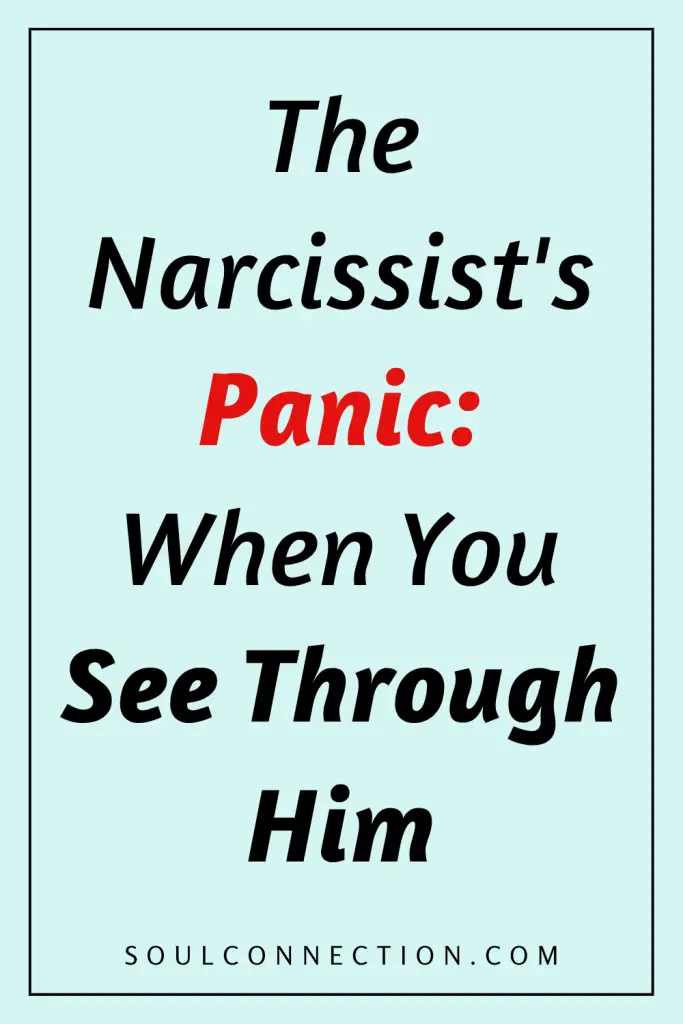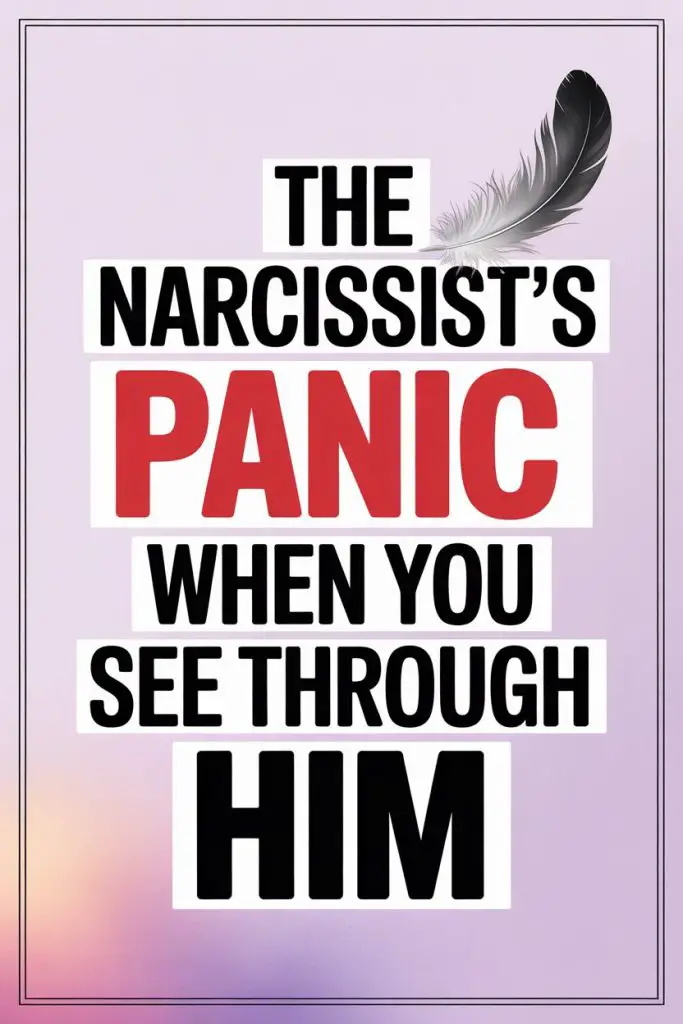Ever watched a magician fumble when the audience guesses his next trick? That’s the narcissist’s panic, right there — except the stakes are higher, and the rabbit in the hat is usually your sanity.
Pull up a chair. It’s time to unpack this unique brand of meltdown.
The Moment the Mask Slips
A narcissist’s charm isn’t just for show; it’s their currency. They trade in smoke, mirrors, and expertly delivered half-smiles. The moment you spot the wires behind the puppet show, everything changes.
People with narcissistic tendencies are invested in staying five steps ahead, running circles around your expectations and reading your reactions. When you show that the game is up? Their world tilts.
For someone used to curating every perception, nothing is more terrifying than the reflection of their true self showing up uninvited.
The panic isn’t always loud. Sometimes it’s a split-second flicker in their eyes, a flinch so quick you might miss it.
Other times, buckle up — you’re about to witness a performance worthy of an Oscar, complete with accusations, grandstanding, or disappearing acts.
Why the Truth Feels Like Kryptonite
Narcissists don’t just dislike being seen; their entire identity rests on avoiding it. The elaborate persona works only so long as it’s believed. Seen through the mask, the illusion breaks.
No one home behind the curtain? Now you’re dealing with both their fear and their fury.
This isn’t just someone who dislikes being called out. To a habitual narcissist, exposure feels existential. You’ve located the one thread that could unravel the whole tapestry — and they know it.
Tricks Up the Sleeves
When the narcissist senses you’ve clocked their game, a handful of classic responses emerge faster than you can say “self-awareness.”
The first is denial. “What are you talking about? You’re imagining things.” If that doesn’t stick, out comes projection: suddenly, you’re the manipulator, the liar, the one with issues.
Some might opt for the hard reset — stonewalling, silent treatments, vanishing for days.
Others crank up the charm, as if doubling down on the charisma will make you forget what you saw. (Spoiler alert: If it worked last time, they’ll try again. Old habits die hard.)
Each trick is an effort to distract, confuse, or guilt you back into the role of unquestioning audience member. If you’re feeling whiplashed, you’re not alone.
Why They Panic (And What’s Really Going On)
It’s tempting to see narcissists as cold, calculating villains. In reality, it’s a little more complicated — and a lot more insecure.
Beneath all that bravado, narcissists fear exposure the way a kid fears monsters under the bed: irrationally, but totally.
Every mask is glued on with shame, patched over with grandiosity. When you see through it, you threaten the only identity they’ve ever believed could be loved.
Panic, then, isn’t just about losing control of the narrative. It’s about feeling utterly exposed, without the tools to handle real intimacy or accountability.
The “fight or flight” response you’re witnessing is as much about terror as it is about ego.
Deflection, Distraction, Drama
Don’t be surprised if, once exposed, the narcissist suddenly finds a new crisis — yours or theirs. The script flips quickly: you’re accused of betrayal, of cruelty, of not understanding their suffering.
Suddenly, there’s a family emergency, a health scare, or a story so wild you wonder if you’ve wandered onto a soap opera set.
This isn’t random. It’s the narcissist’s way of pulling your attention away from the uncomfortable truth. If you’re busy soothing, fixing, or defending yourself, you don’t have time to see the panic.
The drama isn’t about you. It’s a desperate attempt to return to safer emotional waters.
The Aftermath — Gaslighting and Guilt
Once the dust settles, you might find yourself doubting what you saw. “Maybe I was too harsh. Maybe I misread things. Maybe I am the problem.”
Narcissists are world-class at rewriting history.
Gaslighting isn’t just a party trick; it’s a survival skill. They’ll minimize, explain away, or outright deny anything that threatens their carefully constructed persona.
You’re not crazy. You’re not cruel. You saw what you saw. Trust your gut, even when the narcissist tries to rewrite the script.
Your Move — Practical Steps When You See Through Him
Spotting the panic is one thing. Knowing what to do with it is another. Here’s where your power comes back online.
- Don’t chase the story. You’ve seen the truth. No need to get tangled in post-exposure theatrics.
- Hold your boundaries tight. Expect pushback. Stand your ground.
- Limit the stage. Refuse to feed the drama loop. “I’m not discussing this again” is a complete sentence.
- Check in with your reality. If you feel confused, talk it out with someone you trust.
- Protect your peace. If you need space, take it. The urge to “fix” things is natural, but it’s not your job to glue the mask back on.
Taking care of yourself isn’t selfish — it’s necessary. You can’t rescue someone from a panic of their own making.
What This Means for the Relationship
The urge to fix, explain, or rescue is powerful — especially if you care about this person. But here’s the hard truth: seeing through a narcissist, and surviving the panic that follows, often marks a turning point.
Some relationships limp along, each party pretending the mask is still intact. Others end quickly, with scorched earth and blocked numbers.
Occasionally, a narcissist will acknowledge the panic and seek real help, but that’s rarer than a sunny British summer.
Whatever happens, remember: knowing the truth is better than living in a funhouse of lies.
The Freedom of Clarity
You might feel rattled, unsure, or even lonely after calling out the narcissist’s bluff. That’s normal. You’ve broken a spell that might have shaped your reality for months, years — sometimes a lifetime.
Give yourself permission to grieve the fantasy, but celebrate the clarity. You’re not obliged to keep secrets for someone else’s comfort. You’re not a supporting character in their drama.
You saw the wires. That’s power. Use it well.
When the Curtain Falls
Narcissists panic when they’re seen because they never learned how to be loved, flaws and all. Don’t be surprised if the fallout is messy, or if you’re left picking up emotional confetti after their exit.
But here’s the silver lining: every time you see through the act, you’re not just surviving their panic. You’re reclaiming your own script.
You deserve relationships built on truth, not illusion. And if the only magic trick left is pulling yourself out of their hat — well, that’s the best show in town.


